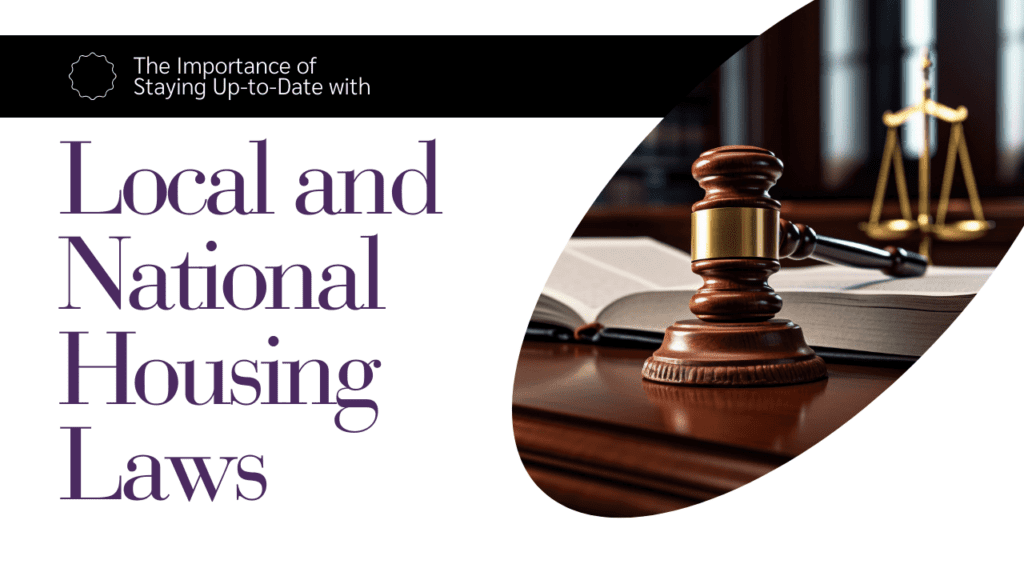
How confident are you that you understand the laws that govern your rental property and the relationships you have in place with tenants and applicants?
How confident are you that you’re complying with all those laws?
It doesn’t take a lot of research and reading to understand the very basics of local, state, and federal rental laws. The laws are always changing, however, and that’s where things can get complicated. The lease agreement you just used last year might be missing some key language. Even existing laws are often applied in new ways, leaving landlords confused and sometimes missing the mark. You could find yourself making an expensive legal mistake, and that’s what we’re hoping to avoid.
Working with a New Jersey property management team can help you stay ahead of the curve when it comes to legal requirements and compliance. If you’re managing on your own, you’ll have to do a little extra work to ensure you’re on the right side of the law.
Let’s take a look at why this matters, and which laws, in particular, require your ongoing attention.
What You Need to Know (and Why)

Rental laws are often detailed and complex. But, you have to know them. Here’s why it helps.
Understanding and Complying with Local, State, and Federal Laws
Protects Your Investment and Your Finances
Protecting your investment property is always a priority, and understanding the laws helps you do that.
Most rental laws come down to tenant rights. This can be frustrating for a lot of landlords, who feel like there are more protections in place for residents than for owners. But, when you acknowledge and respect the rights of tenants, you’ll be more likely to attract good renters. When you’re keeping up with habitability laws, you’re providing a property that’s safe, habitable, and attractive to potential residents.
Keeping a home habitable by legal standards will reduce your need for emergency repairs and ensure you retain a high property value. And, you don’t want to meet the bare minimum. You want to go over and above that and provide a home that’s modern, attractive, and welcoming. This will attract the best tenants and the highest rents. Respecting the law is your starting point.
Ultimately, it’s necessary to know the local and national laws that apply to your property or portfolio in order to provide a rental home that’s successful on the market.
Think of it as a money matter. When you’re in compliance and able to avoid penalties, you’re protecting your rental income and your financial stability. Owners who are unaware of local or statewide requirements could find themselves making serious and expensive legal mistakes.
We’re not kidding when we say these mistakes are expensive. We’ve seen fair housing penalties for a first-time offender reach $16,000.
Earning More is Good. And, You’ll Earn More
With Legally Compliant Rental Practices
Your earnings are driven by your rental income, but it’s also a lot more than that. Think about where and when you collect funds from your tenant; security deposits, pet fees, and late rent fees are a few examples of money that flows from them to you. All of these impact what you earn on your property. So, you need to know the laws and restrictions that surround them.
To maximize your rental income, you have to know how much you can charge in rent. There’s no rent control in New Jersey as a state, but local municipalities can create their own rent stabilization programs. Follow this so you know how you’re impacted. When it comes to rental amounts and increases, you will need to know how often you’re permitted to raise the rent, and how much notice you should give your tenants before it increases.
Your residents have rights to privacy and quiet enjoyment of their property. If you show up unannounced and insist on going into the property, you could find yourself in legal trouble. If you don’t fix something that your tenants asked you to fix, they may withhold rent. All of these things will have a dramatic impact on what you earn. Avoid these expenses and threats by understanding the laws.
Know the Laws because Good Landlords
Know the Laws!
Are you thinking about your reputation? Because reputation is a great reason to be knowledgeable about rental laws. Housing laws are likely to change from time to time, whether we’re talking about how long you have to return a security deposit or what you can and cannot do when it comes to support and service animals.
You don’t want to look like you don’t know what you’re doing. It’s embarrassing, and it won’t draw a lot of good tenants to your rental property.
By staying in the loop and up-to-date on the latest housing developments, including tax incentives and tenant protections, you will have a competitive edge over other owners who may be slowed down by trying to understand what they can and cannot do.
Fair Housing Laws – National and State
 When we talk about fair housing, we often think about federal laws, specifically the Fair Housing Act. This is a landmark piece of legislation that was signed into law on April 11, 1968.
When we talk about fair housing, we often think about federal laws, specifically the Fair Housing Act. This is a landmark piece of legislation that was signed into law on April 11, 1968.
You need to know that the State of New Jersey has its own fair housing laws, and an argument could be made that our state laws go further in their protections than the federal laws do.
The New Jersey Law Against Discrimination (LAD) prohibits discrimination in housing. It includes rules about using criminal background reporting during the screening process. It describes disparate impact versus disparate treatment. It references unlawful steering and sexual harassment.
When you rent out a property in New Jersey, you need to understand all fair housing laws on a state and federal level. That’s because fair housing violations are expensive, and worse than that, breaking a fair housing law can potentially damage your reputation as a landlord.
Make sure you understand fair housing requirements so you can avoid potential risk, liability, and lawsuits.
Federal Fair Housing Laws
You need to stay up-to-date with the federal Fair Housing Act because it’s the initial piece of legislation that prevents you from discriminating against tenants or applicants. The Department of Housing and Urban Development is responsible for this law, protecting seven specific classes from discrimination. You need to know this law so that you do not discriminate based on:
- Color
- Race
- Disability
- Familial status
- National origin
- Religion
- Sex
These are considered the federal “protected classes,” and you need to be aware of the potentially discriminatory language that’s often used as well as practices that are inconsistent or unfair. You may not intentionally discriminate against someone for any of these reasons, but unintentional mistakes are easy to make. Be cautious, and always work with a property manager if you’re in doubt about how you should proceed.
New Jersey Fair Housing Laws
State law has a few more protected classes than federal laws. In New Jersey, you cannot discriminate in housing based on actual or perceived:
- Race or color;
- Religion or creed;
- National origin, nationality, or ancestry;
- Sex, pregnancy, or breastfeeding;
- Sexual orientation;
- Gender identity or expression;
- Disability;
- Marital status or domestic partnership/civil union status;
- Liability for military service;
- Familial status (having children under age 18); and
- Source of lawful income used for rental or mortgage payments.
The state Attorney General has a great fact sheet on fair housing on their website, which we would encourage you to download as a quick reference tool.
Advertising Your Rental Home:
What to Say and What Not to Say

You need to stay up-to-date with the laws in New Jersey and in your local region because you will likely be advertising homes for rent. When you’re advertising, you cannot steer one “type” of tenant towards or away from your property. You need to be intentional and inclusive with your language.
You might have never realized that fair housing violations could be made while advertising that you have a home for rent.
An aggressive, strategic marketing plan will help you attract tenants to your property. It’s good to be highly descriptive and even over-zealous when you’re putting your rental home in front of the best possible tenants you’re hoping to attract. What you need to remember is that any of your listings, marketing materials, or signs need to comply with fair housing laws.
As you’re preparing to market your rental home, you will want to include details in your listing that discuss the home’s size, what the rent will be per month, when the home will be ready for occupancy, and what the property’s benefits are – whether those happen to be great natural light, updated kitchen appliances, or a fenced backyard.
Here are some examples of the things you cannot say in your marketing and advertising:
| “Great for single professionals.” | “No kids under 12.” |
| “Close to Christian churches.” | “College students only.” |
This type of language can be seen as discriminatory against several of the law’s protected classes.
It’s better business to keep your rental property marketing accessible to everyone who is qualified. Including or excluding certain groups like families or religious minorities can be seen as discriminatory. The best advice we can give you is to keep your advertising focused on what the property is and what it has to offer.
Don’t make assumptions about who would want to live there. And, never talk about the types of tenants you would prefer.
Tenant Screening and Fair Housing:
Consistent Rental Criteria
Knowing the laws means creating processes and procedures that will protect you and your property. Put together a standard rental criteria or a set of qualifications, and put it in writing. Then, provide these criteria to any tenant who is interested in filling out an application. You’ll want to make sure you follow your own standards consistently every time you screen a potential tenant.
You have to screen each application against the same requirements, otherwise, you could be accused of discrimination. Denying one applicant because of a 590 credit score is not going to hold up in court if the tenant you eventually place has a 580 credit score.
Be consistent, and make sure you’re approving and denying applicants for the same reasons.
Written standards will help you with that consistency, and it will also make your screening process more objective. Set up the standards you seek in terms of:
- Credit scores
- Income requirements
- Criminal history
- Eviction history
- Positive rental references
Having these criteria in place and providing them to applicants will make it easy for you to move through the application process because you’ll know exactly who is approved and who is not just by looking at the data. It’s more likely to protect you against any potential claims of discrimination.
When is a Dog Not a Pet?
Laws Around Service and Companion Animals
 You get to decide whether or not you want to allow pets in your rental property. Maybe you’re fine with cats but not dogs. Maybe you’ll allow one pet per tenant or any animal that’s smaller than 20 pounds. You can structure your pet requirements and restrictions any way you choose.
You get to decide whether or not you want to allow pets in your rental property. Maybe you’re fine with cats but not dogs. Maybe you’ll allow one pet per tenant or any animal that’s smaller than 20 pounds. You can structure your pet requirements and restrictions any way you choose.
But not every animal is a pet.
What?
Not every animal is a pet. We’re talking about service animals and companion animals. Those are not pets. They are accommodations.
At least, that’s what the law says. If you don’t know this law, you’re at risk of denying a tenant for an illegal reason.
You cannot deny tenants with service or support animals. Even if you have a strict no-pet policy.
You have to allow them. And, you cannot charge a pet fee or pet rent. There are different ways to treat service animals and companion animals, so you need to understand what type of animal you’re working with and what kind of rights your tenant has.
Security Deposit Laws

Security deposits need to be understood thoroughly by every landlord who collects them.
Get to know The Rent and Security Deposit Act, which will tell you everything you need to know about how to legally collect, hold, and return a tenant’s security deposit. We’re sharing some of the highlights with you, so you understand the why behind knowing the law. This is a very practical part of being a landlord in New Jersey. You have to understand the purpose of a security deposit and what to do with it.
- Collecting the Deposit
How much should you charge as a security deposit? The law doesn’t say, but it does say how much you cannot charge. New Jersey’s legal limit is one and a half months’ rent. That’s the maximum you can collect; the equivalent of 1.5 months of rent. So…if you’re renting out a unit for $2,000 a month, the maximum security deposit for that unit will be $3,000.
When you increase the rent, you are permitted to raise the security deposit to match the rental increase. However, you cannot increase the security deposit by more than 10 percent every year.
- Holding the Deposit
You need to hold the deposit in a money market fund or an interest-bearing savings account. If you choose a money market fund, make sure that you’re depositing the amount with an investment company that is based in New Jersey. It has to be registered under the Investment Company Act of 1940 and have a maturity date of less than one year.
Whether you use the money market fund or the interest-bearing account, you have to be sure you pay your tenants the interest or earnings produced by the deposit. This money can go directly to the tenant or be used towards rent.
- Returning the Deposit
You have 30 days in New Jersey to return the security deposit to your tenants. If you’re going to withhold all or part of the deposit, you’ll need to provide an itemized list of what was deducted and why. You’re legally permitted to withhold money from that deposit for unpaid rent and late fees, as well as unpaid utilities. You can also charge the deposit for the costs to repair any damage that goes beyond the definition of normal wear and tear. If the cost of the damages exceeds the amount of the security deposit, you can take the tenants to court to pursue those damages.
This is not a comprehensive listing of the laws you need to know. We have not talked about eviction or habitability. There are laws around late fees and landlord vs. tenant responsibilities.
What we wanted to show you is that it’s critical to stay up-to-date on all the laws that pertain to your property. Those we’ve talked about today get most of the attention from tenants, landlords, the courts, and property managers.
We can help. We know it’s hard to stay up-to-date, and we do that for you. It’s one of the benefits of working with local property managers. Please contact us at Realty Solutions if you want to talk about your investments, your legal responsibilities, or anything pertaining to your rental properties and your goals. We lease, manage, and maintain homes in Audubon, Collingswood, Cherry Hill, Haddon Heights, Blackwood, and the surrounding communities.
